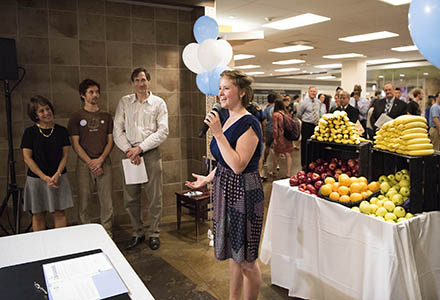For years, sustainability has played a leading role at the University of North Carolina at Chapel Hill.
Whether it’s been teaching the next generation of environmental scientists or implementing new initiatives, sustainability has been weaved into Carolina’s fabric.
“Sustainability is a huge part of who we are,” said Brad Ives, associate vice chancellor for campus enterprises and chief sustainability officer. “We’ve been long recognized as an environmental leader in education and in action.”

On April 26, Carolina showcased two of its most recent sustainability efforts with a visit to the Battle Grove Restoration Project and the signing of the Real Food Campus Commitment — which will bring more local, organic and fair food to campus dining halls.
The two projects serve as highlights of the many efforts campus is undertaking toward the University’s new Three Zeros Initiative, which will officially launch in the fall. The initiative aims to accomplish carbon neutrality by 2050, send zero waste to landfills and achieve net zero water use.
“We’ve seen so many advances just in the last couple of years,” said Chancellor Carol L. Folt. ”It’s really important because they not only suit our desire to make things better for the planet, they’re economically better for us, they create better habitats, and the students are involved with faculty and staff.”
Among those advances is the Real Food Campus Commitment that Folt and Ives officially signed during a short ceremony in the Top of Lenoir Dining Hall. Already the leading large university campus nationwide in the amount of Real Food served, the pledge will take Carolina one step further.
“It’s quite an honor and privilege to be able to do this on behalf of the University,” Folt said. “We’re pledging to serve 20 percent fair, local or organic food in ‘all-you-care-to-eat cafeterias.’ And that doesn’t mean we’ll stop there, but it’s a really great pledge to get it going.”
The pledge is part of a national movement led by students and universities to create a healthy, fair and green food system.
“Rather than just calling it ‘local’ or ‘sustainable,’ it’s really a more holistic approach to reconfiguring and reforming our food system,” said Carolina senior Claire Hannapel, a member of the Real Food Challenge steering committee. “It encompasses local and community-based food, food that is humanely raised, ecologically sound, and it’s fair. It’s encompassing our whole food supply chain from animals on the farms to the people in our dining halls.”
The commitment, Ives said, will also provide economic benefits for the University.
“We’ve worked with the students on campus and with the farm community here in North Carolina to make sure that we have local agricultural products that over time are even saving us money,” he said. “We’re not having to pay to transport them from California or Florida to put fresh fruits, vegetables and meats on the table here to feed our students.”
After signing the pledge, Folt toured one of the University’s other sustainability projects at the Battle Grove Restoration Project, which turned a frequently flooded field near McIver Residence Hall into a small aboveground stream.
“What’s wonderful about this project is that it has allowed us to build a beautiful riparian landscape around a meandering historic stream in a gorgeous place on campus and service our water,” Folt said. “It just brings together our science, our technology, our energy services, our facilities management and open space in a really exciting way.”
Before the project was completed, water from the creek was contained by an underground pipe and concrete ditch. But the field now consists of a stream with a filtration process that will naturally filter pollutants and contaminants out of runoff water.
“With the wetlands restoration project at Battle Grove, we’re making a commitment to water quality throughout North Carolina,” Ives said. “The rain that falls here on campus, that’s the start of a stream. That stream is going to course all the way through into our rivers and ultimately into the sounds of North Carolina where a lot of our seafood comes from. If we can do something here to lower the nutrient load and get sediment out of the water, by doing that we’re improving water quality from here all the way down to Morehead City and Nags Heads.”
Not only will the Real Food Campus Commitment and Battle Grove Restoration Project help Carolina achieve its sustainability goals set forth in the Three Zeros Initiative, Ives hopes that they can serve as another form of education for students.
“We start with the stomachs of our students, and hopefully here we will effect their minds and give them a chance to increase their learning and see sustainability in action,” he said. “Something that will leave the page of their textbook and come alive.”
Story by Brandon Bieltz, photos by Jon Gardiner and video by Rob Holliday, Office of Communications and Public Affairs.
